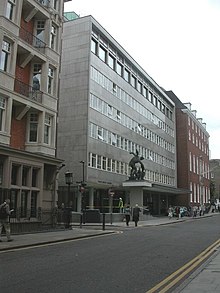Vincent Tewson
Sir Vincent Tewson Walter Citrine | |
|---|---|
| Successor | George Woodcock |
| Board member of | International Confederation of Free Trade Unions Independent Television Authority |
| Military career | |
| Allegiance | United Kingdom |
| Service/ | British Army |
| Years of service | 1917–1919 |
| Rank | Lieutenant |
| Unit | West Yorkshire Regiment |
| Battles/wars | World War I • Western Front |
| Awards | Military Cross |
Sir Harold Vincent Tewson
Biography
Harold Vincent Tewson was born in Bradford, Yorkshire. After leaving school at the age of 14,[2] he began working in the office of the Amalgamated Society of Dyers, Finishers and Kindred Trades.[1]
He served in the Army during World War I, being commissioned as a second lieutenant in the
- 2nd Lieutenant Harold Vincent Tewson, West Yorkshire Regiment.
- "For conspicuous gallantry and devotion to duty. When his men came under very severe machine-gun fire he dashed in front, and so encouraged them by his fearless example that they drove the enemy back and captured the objective. When the fire became so heavy that a gap was caused on his flank, he ran along the front of the line, rallied the men and formed a defensive flank, thus saving a critical situation."[5]
On 1 February 1919 Tewson was promoted to lieutenant in the 5th Battalion of the West Yorkshires.[6]
After the war, Tewson returned to Bradford to work for the Dyers Union.

In the late 1930s, during the
Tewson succeeded Walter Citrine as General Secretary of the TUC in 1946,[1] supporting the post-war economic recovery of Europe, and assisting in creating a trades union advisory Committee for the Marshall Plan. In 1949 he was the secretary of the conference at Geneva during which the International Confederation of Free Trade Unions (ICFTU) was created, and served as its President from 1951 to 1953.[1] He was knighted on 14 March 1950.[12] Tewson retired as General Secretary in 1960, and in November of that year was appointed a part-time member of the London Electricity Board.[13] In 1964 he was appointed a member of the Independent Television Authority.[14]
He died in Letchworth, Hertfordshire in 1981.[1]
His son Peter Tewson (b.1944) attended
References
- ^ a b c d e f "Sir Vincent Tewson". Encyclopædia Britannica. 2015. Retrieved 30 March 2015.
- ^ a b "Sir Vincent Tewson". The Times. London, England. 2 May 1981. p. 16.
- ^ "No. 30232". The London Gazette (Supplement). 14 August 1917. p. 8319.
- ^ "No. 30507". The London Gazette (Supplement). 1 February 1918. p. 1606.
- ^ "No. 30780". The London Gazette (Supplement). 2 July 1918. pp. 7925–7926.
- ^ "No. 31285". The London Gazette (Supplement). 8 April 1919. p. 4726.
- ^ "The Trades Union Congress, 1936-1939: Its history and organisation". University of Warwick. 2015. Retrieved 30 March 2015.
- ^ "Aid to Spain". Modern Records Centre, University of Warwick. 4 April 2016. Retrieved 5 August 2016.
- ^ Buchanan, Tom (3 October 2009). "Basque Refugee Children in Britain, 1937-1939: Personal memory and public history". Basque Children of '37 Association UK. Retrieved 5 August 2016.
- ISBN 9780853156437.
- ^ "No. 35586". The London Gazette. 5 June 1942. p. 2489.
- ^ "No. 38865". The London Gazette. 17 March 1950. p. 1356.
- ^ "People in the News". Middlesex County Times. 12 November 1960. p. 14.
- ^ "No. 43403". The London Gazette. 7 August 1964. p. 6682.
